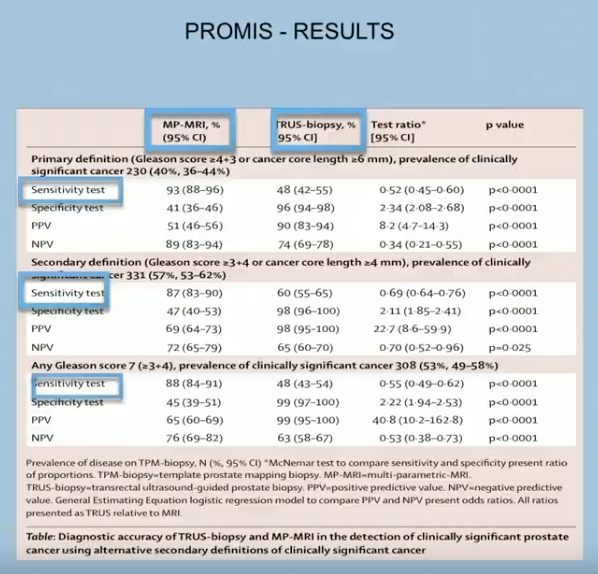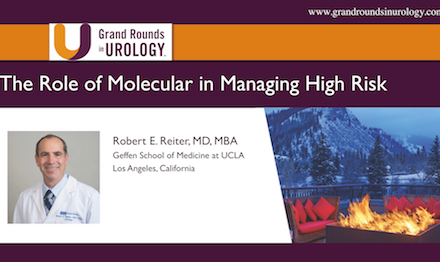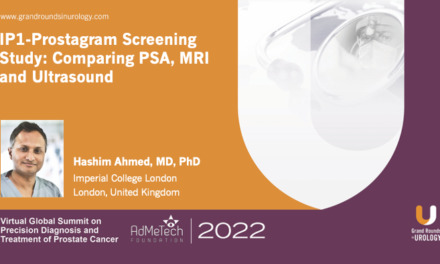Dov Kadmon, MD, presented “Role of MRI in the Current Management of Prostate Cancer” during the 23rd Annual Innovations in Urologic Practice on September 14, 2018 in Santa Fe, New Mexico.
How to cite: Kadmon, Dov. “Role of MRI in the Current Management of Prostate Cancer” September 14, 2018. Accessed Jul 2024. https://grandroundsinurology.com/role-of-mri-in-the-current-management-of-prostate-cancer/
Role of MRI in the Current Management of Prostate Cancer – Summary:
Dov Kadmon, MD, discusses the role of MRI in the diagnosis, staging, and surveillance of prostate cancer. He then reviews two high quality studies that evaluate the possibility of MRI guided biopsies as an alternative to standard ultrasound biopsies.
Abstract:
The role of MRI in prostate cancer is still being defined. However, we have witnessed increased utilization of MRI in prostate cancer management. Local and regional staging, as well as selection of patients for targeted biopsy, are the main applications.

Two large recent studies similarly support the use of MRI fusion biopsies in biopsy naïve patients. The first study, termed “PROMIS,” was published in Lancet in 2017.(1) This study showed that the sensitivity of multiparametic MRI for detecting clinically significant prostate cancer was 88% (compared to 48% for the regular ultrasoun-guided 12 cone biopsy).
Secondly, the New England Journal of Medicine published the study termed the “PRECISION” trial in 2018.(2) During this study, more patients undergoing MRI-guided biopsies had clinically significant disease (38% versus 26%). Conversely, fewer patients were diagnosed with clinically insignificant cancers (9% versus 22%). Furthermore, 28% of the patients avoided biopsy altogether based on a negative prostate MRI.
At the present time, guidelines set by the National Comprehensive Cancer Network (NCCN), American Urological Association (AUA), and European Association of Urology (EAU) support the use of MRI-targeted biopsies in patients having repeat biopsies following negative previous biopsies. However, the consensus is that there is no yet sufficient evidence to declare the MRI-guided biopsy as the “gold standard.”
At our institution, we started an MRI/ultrasound fusion biopsy program during the past three years. So far, we performed 275 fusion biopsies. We have learned quality control is paramount, starting with the MRI technician and ending with the urologist performing the biopsy.
About Innovations in Urologic Practice
Innovations in Urologic Practice (IUP) is an annual CME-accredited conference devoted to updating urologists on the rapidly changing healthcare environment. Topics focus on innovative diagnostic and treatment strategies, controversies, new and currently developing technologies, and challenges in today’s urologic practice. Dr. Kadmon presented this lecture during the 23rd IUP in 2018. Please visit this page in order to learn more about future IUP meetings.
References
- Ahmed HU, El-Shater Bosaily A, Brown LC, et al. Diagnostic accuracy of multi-parametric MRI and TRUS biopsy in prostate cancer (PROMIS): a paired validating confirmatory study. Lancet 2017; 389:815-822.
- Kasivisvanathan V, Rannikko AS. Borghi M, et al. MRI targeted or standard biopsy for prostate cancer diagnosis. New England Journal of Medicine 2018; 378:1767-1777.
ABOUT THE AUTHOR
Dr. Kadmon is a Professor of Urology at Baylor College of Medicine in Houston, Texas. He received his MD from Hadassah Medical School in Jerusalem, Israel; completed residencies at Rokah Municipal Governmental Medical Center in Jerusalem and Washington University School of Medicine in St. Louis, Missouri; and received a Fellowship in Urologic Oncology at Washington University Affiliate Hospitals in St. Louis, Missouri.
Dr. Kadmon is a devoted clinician. In his practice, he focuses on diagnosing and treating prostate cancer. He is particularly interested in using surgical techniques to treat prostate cancer. To that end, he has performed over 1,000 open radical prostatectomies, as well as over 1,000 robotic-assisted laparoscopic radical prostatectomies. Dr. Kadmon is also an internationally respected writer and researcher. He has published over 150 papers in the field of urology, and has received grant money for his research from the National Cancer Institute on multiple occasions. He has also served as a consultant on prostate cancer for the National Cancer Institute. Dr. Kadmon’s research interests include gene therapy and immunotherapy for prostate cancer, biological therapy for prostate cancer, and methods for preventing prostate cancer.




